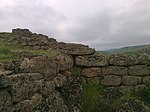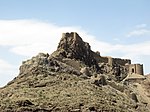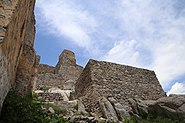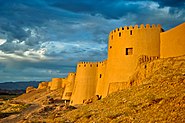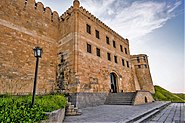
Zanjan is a city in the Central District of Zanjan County, Zanjan province, Iran, serving as capital of the province, the county, and the district.

Shahr-e Kord is a city in the Central District of Shahrekord County, Chaharmahal and Bakhtiari province, Iran, serving as capital of the province, the county, and the district. It is the largest city in the province, and is 90 km away from Iran's third largest city, Isfahan.

Sarakhs is a city in the Central District of Sarakhs County, Razavi Khorasan province, Iran, serving as capital of both the county and the district. Sarakhs was once a stopping point along the Silk Road, and in its 11th century heyday had many libraries. Much of the original city site is now just across the border at Serakhs in Turkmenistan.
Bampur is a city in the Central District of Bampur County, Sistan and Baluchestan province, Iran, serving as capital of both the county and the district.

Shahr-e Sukhteh, c. 3550–2300 BC, also spelled as Shahr-e Sūkhté and Shahr-i Sōkhta, is an archaeological site of a sizable Bronze Age urban settlement, associated with the Helmand culture. It is located in Sistan and Baluchistan Province, the southeastern part of Iran, on the bank of the Helmand River, near the Zahedan-Zabol road. It was placed on the UNESCO World Heritage List in June 2014.

Darreh Shahr County is in Ilam province, Iran. Its capital is the city of Darreh Shahr.

Oshida or Mount Khwaja or Mount Khwajeh is a flat-topped black basalt hill rising up as an island in the middle of Lake Hamun, in the Iranian province of Sistan and Baluchestan.

Gotvand County is in Khuzestan province, Iran. Its capital is the city of Gotvand.
Hesaruiyeh is a village in Khatunabad Rural District, in the Central District of Shahr-e Babak County, Kerman Province, Iran. At the 2006 census, its population was 221, in 54 families. Hesaruiyeh is located roughly 10 kilometres (6.2 mi) southeast of Shahr-e Babak.

Darreh Shahr is a city in the Central District of Darreh Shahr County, Ilam province, Iran, serving as capital of both the county and the district. Darreh Shahr is in the southeastern part of the province, in the northern foothills of the Kabir Kuh ranges. According to the 2016 census there are 21,900 residents, making it the second-largest city in the province.
The Central District of Gotvand County is in Khuzestan province, Iran. Its capital is the city of Gotvand.
Sheykh Makan is a village in Aramu Rural District, in the Central District of Darreh Shahr County, Ilam Province, Iran. At the 2006 census, its population was 800, in 154 families. The village is populated by Kurds.
Saleh Shahr is a city in the Central District of Gotvand County, Khuzestan province, Iran.
Sheikh Rajeh is a village in Bisheh Sar Rural District, in the Central District of Qaem Shahr County, Mazandaran Province, Iran. At the 2006 census, the population of Sheikh Rajeh was 179, in 50 families. شیخرجه دارای یک چشمه بسیار زیبا و بزرگ با محیطی دلچسب بود که متاسفانه با همت شورا و دهیاران عزیز تخریب شد.

Javan Mard-e Ghassab Tomb is a building in Shahr-e Ray located in south of Tehran. It was built during the Qajar period, at sometime during the reign of Fath-Ali Shah Qajar.

Saint Sarkis Church is an Armenian Apostolic church in Baron Avak neighborhood of Tabriz, Iran. St. Sarkis was built with funding from the Petrossian family. Built in 1845, the church is in the courtyard of Tamarian Armenian school building, which was extended out to add the Sahakian School. The Haykazyan school was located across from these, but was closed after being damaged in the Iran-Iraq war.

Gavmishan Bridge is a historic bridge in Darreh Shahr County, Ilam Province, Iran. The bridge was built in the late Sasanian era on Karkheh River, parts of which constitute the modern-day border of Ilam and Lorestan provinces. It is 175 m (574 ft) in length and about 8 m (26 ft) in width. It has the longest arch span among the ancient bridges in Iran and the world. Many experts consider it an engineering feat, considering the time when it was built, the material used and the floods it has withstood during its age of 1,400 years.

The Tomb of Hadi Sabzavari is built by the Qajar dynasty and is the site of the Hadi Sabzavari burial. This building is located in Sabzevar, Iran.

The Tomb of Shaykh Haydar is located in the city of Meshginshahr, Iran. It was first built in the 14th century during the Ilkhanate period, and later served as a mausoleum for Shaykh Haydar, the father of Shah Ismail I. It is number 184 on the list of Iranian national heritage monuments.

















